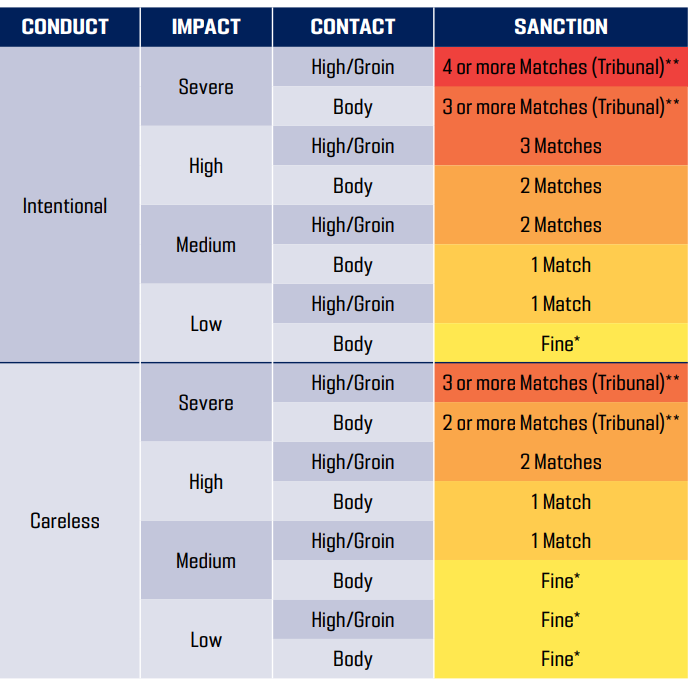New year, same old scrutiny on the AFL's Match Review Officer (MRO) and tribunal. And didn't we have a doozy to kick things off in Round 1?
Three cases, all three-week bans, all upheld by the tribunal on Tuesday night. The most vociferously-opposed of which was Kangaroo Jackson Archer's contest with Luke Cleary, which left the Bulldog unconscious on the ground, and with concussion.
And while most footy fans and pundits seem to be getting on board with protecting players' heads and punishing players who are careless in approaching contests, the Archer decision has -- to put it mildly -- split opinions. Talkback and social media was flooded with thoughts ranging anywhere from "Archer should have been given a free kick" to "he deserved more than three weeks", with a good number landing somewhere in the "Archer couldn't have done anything different and he should get off" basket.
Except Archer could have done something different. The tyro cannoned into the contest area despite at one point being six times further from the ball than Clearly and his direct opponent.
"This was not a contested ball situation," The tribunal findings said. "Cleary was always closer to the loose ball and was always going to reach the loose ball before Archer."
Archer was never going to make it in time, and had to make the decision to approach more slowly with an aim to corral and then tackle once the ball was in Cleary's possession. Put simply, he could have approached the contest in a safer manner, which showed a duty of care to his opponent.
Jackson Archer has received a three-match ban for this incident involving Luke Cleary.
— AFL (@AFL) March 16, 2025
Full MRO findings: https://t.co/6PGZBhPYDT pic.twitter.com/s8Xhb1kGOD
This isn't just some grumpy journo getting on a high horse. It's a thought shared by the tribunal.
"Archer approached the contest at excessive speed, giving himself no reasonable opportunity to avoid harmful contact with Cleary in the circumstances that foreseeably arose," the findings said.
"Graphs indicate that he did decrease his speed by about 25% prior to impact. But given that he was running about as fast as he could, given that he was approaching Cleary from front on, and that Cleary had his head over the ball, and given that he could not reasonably predict what position clear he would be in at the moment of impact, he slowed too little and too late.
"His duty of care required him to slow more appreciably and earlier in order to give himself the opportunity to avoid or minimise head high contact."
The AFL is clearly trying to change the habits of the professional footballer. Yes, habits many of these players grew up with. Attacking the footy at full throttle, tackling hard, and making the opposition feel the hits.
But adding in the caveat that players must show a duty of care to their opponents -- especially if they are clearly not first to the footy -- is not an unreasonable asterisk on playing the game with physicality.
You could almost hear the cries of displeasure when the verdict was handed down. "What do you want him to do?" "The game's dead!"
Rubbish. It won't kill the game. The players aren't going soft. The AFL isn't going 'woke'. The game is as fast as it's ever been, the players are as skilled and as strong as ever, and their courage should never be questioned.
Footy is an incredibly tough game, and while accidents can and do happen on the field, and non-contact injuries can also occur, reducing the number and severity of preventable injuries is in everyone's best interests, not just the AFL's. And this was preventable.
We already see players adapting every week. Players as little as three or four years ago who would have approached a 60-40 contest at 100% intensity are now showing restraint, waiting for the opposition to gather the footy and then tackling them - fairly and with vigour.
Of course, the league is concerned about the potential for legal action arising as a result of concussion and how it has dealt with that in the past, but no teammate, fan, or parent wants to see players getting hurt in preventable instances, and the Archer-Cleary contest is one of them.
There's some argument that Cleary didn't keep his feet in the contest, a point acknowledged by the tribunal. The findings indicated that while players are encouraged and taught to keep their feet and not go to ground, "this does not always happen".
Archer is also lucky he didn't break his leg in the contest, and it brings up an interesting hypothetical: would he have faced scrutiny for his role in approaching the contest in what the tribunal thinks is a dangerous manner? Even a broken leg in this instance would have been preventable.
Some of the fans' frustration may be misdirected, at the MRO and tribunal itself instead of the rules as they currently are.
One issue could be the framework by which the MRO and the tribunal are guided. It's inflexible. Since the start of last year, the guidelines followed have been that any incident which causes concussion is to be graded as 'severe impact'.

On the MRO's table for classifying offences, severe impact, whether careless or intentional, is fixed at a minimum of three matches. Accidental clashes which result in concussion are either deemed a reportable offence worth three weeks, or nothing.
So what do clubs and players need to do? Prove they did everything reasonable to show their opposition duty of care when approaching a contest. Prove their act was not even 'careless'.
'They had eyes for the footy' is no longer a decent defence. It's 'did they show a duty of care in the contest?'
And surely that's not an unreasonable thing?
